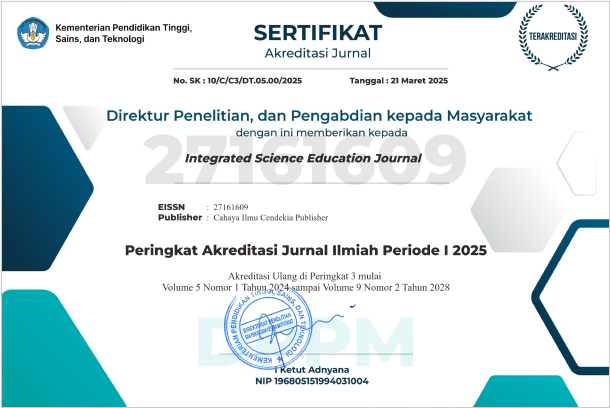Teachers' Views Regarding the Character of Students' Perseverance in Science Learning
Abstract
Purpose of the study: The primary objective of this research was to describe teachers' views regarding the importance of students' persistent character in learning science when teaching class VII students at Junior high school.
Methodology: This research used the qualitative Miles and Huberman method with a sample of 1 teacher representing 3 science teachers at Junior high schools in Indonesia, Myanmar, and Vietnam. Researchers conducted interviews with science teachers. The sampling technique used was purposive sampling. Research data was taken using the interview method. The data analysis used is the results of interviews linked to theories from various literature.
Main Findings: The findings of this research show that the results of teacher interviews at Junior high school, teachers said that persistence plays an important role in creating an effective learning environment. Students who have a high level of perseverance will achieve better results in understanding complex science concepts and prepare students who are tough and never stop learning.
Novelty/Originality of this study: The benefit of this research is to know the importance of students' persistent character in understanding science learning. Hopefully, future researchers will be better off adding student and teacher research methods as samples and questionnaires or question research instruments. This aims to understand better the character development indicators of student persistence in learning.
References
W. P. Lestari, “Studi pendahuluan: Pembelajaran berbasis local wisdom disertai strategi integrated science untuk melatihkan keterampilan berpikir kritis ipa siswa smp[Preliminary study: Local wisdom-based learning accompanied by integrated science strategies to train junior high school students' science critical thinking skills],” Scienceedu, vol. I, no. 1, P. 15, 2019, Doi: 10.19184/Se.V1i1.9488.
N. H. M. Lubis, “Penerapan model project based learning pada pembelajaran mengkontruksi karya ilmiah di sma[Application of the project based learning model in learning to construct scientific work in high school],” Literasi J. Ilm. Pendidik. Bahasa, Sastra Indones. Dan Drh., vol. 13, no. 1, Pp. 120–129, 2023, Doi: 10.23969/Literasi.V13i1.6806.
[3] A. Ardiansyah And M. Mu’aminah, “Analisis sikap ilmiah peserta didik pada praktikum mandiri berbasis proyek pada materi optik smpn 4 Sojol di masa pandemik[Analysis of students' scientific attitudes in project-based independent practicum on optics material at SMP 4 Sojol during the pandemic],” Koord. J. Mipa, vol. 1, no. 2, Pp. 31–38, 2020, Doi: 10.24239/Koordinat.V1i2.17.
[4] D. Rahmiati And P. Nuraulia, “Analisis variasi gaya mengajar guru terhadap hasil belajar ipa siswa sekolah dasar[Analysis of variations in teacher teaching styles on elementary school students' science learning outcomes],” Proceeding Umsurabaya, vol. 2, pp. 85–98, 2021.
R. P. Taupik., Firman., and D. Desyandri, “Analisis kebutuhan penggunaan media pembelajaran ipa berbasis teknologi di era merdeka belajar[Analysis of the need for using technology-based science learning media in the era of independent learning],” Didakt. J. Ilm. Pgsd Stkip Subang, vol. 8, no. 2, pp. 2770–2780, 2023, doi: 10.36989/Didaktik.V8i2.575.
L. N. Azizah and L. Rosdiana, “Penerapan model pembelajaran inkuiri terbimbing untuk meningkatkan keterampilan berpikir kritis siswa ditinjau dari gender pada materi pencemaran lingkungan[Application of the guided inquiry learning model to improve students' critical thinking skills in terms of gender in environmental pollution material],” Pensa E-Jurnal:Pendidikan Sains, vol. 10, no. 1, pp. 161–166, 2022.
S. V. B. P. Ardelina., M. Simorangkir., and M. Damanik, “Realisasi strategis pembelajaran biologi berbasis ict (information and comunnication technology) dengan penerapan kerangka kerja berbasis keterampilan abad 21[Strategic realization of ICT (information and communication technology)-based biology learning with the application of a 21st century skills-based framework],” Pros. Semin. Nas. Biol. Dan Pembelajarannya, pp. 291–300, 2022.
I. M. G. Swiyadnya., I. M. C. Wibawa., and I. K. A. Sudiandika, “Efektivitas model problem based learning berbantuan lkpd terhadap hasil belajar muatan pelajaran ipa [The effectiveness of the problem based learning model assisted by LKPD on the learning outcomes of science lesson content],” Mimb. Pgsd Undiksha, vol. 9, no. 2, pp. 203, 2021, Doi: 10.23887/Jjpgsd.V9i2.36111.
E. Rahmawati and U. I. Hasanah, “Pemberian Sanksi (Hukuman) Terhadap Siswa Terlambat Masuk Sekolah Sebagai Upaya Pembentukan Karakter Disiplin,” Indones. J. Teach. Educ, vol. 2, no. 1, pp. 236–245, 2021.
T. Suprihatin and R. Rohmatun, “Ketekunan Akademik Pada Siswa Sma X Semarang Di Era Pandemi Covid-19,” Pros. Berk. Psikol, vol. 2, no. 1, pp. 378–387, 2020.
E. Adha and C. L. Permatasari, “Peran Pendidikan Kewirausahaan Dalam Menumbuhkan Kesiapan Berwirausahaa Siswa,” J. Econ. Educ, vol. 15, pp. 60–71, 2021, doi: 10.19184/Jpe.V15i1.21158.
S. Zulaekho, “Penggunaan metode eksperimen untuk meningkatkan motivasi belajar ipa pada tema peristiwa dalam kehidupan bagi siswa kelas va sd negeri 2 Leteh Kecamatan Rembang[The use of experimental methods to increase motivation to learn science on the theme of events in life for students in class va elementary school 2 Leteh Rembang District],” J. Pendidik. Dasar, vol. 8, no. 1, pp. 1–6, 2020.
C. P. Khairani and M. Mudjiran, “Development of guidance and counseling modules to improve students' tough character in learning,” Jrti (Jurnal Ris. Tindakan Indones., vol. 7, no. 4, pp. 142–150, 2022.
E. P. Rubiana and D. Dadi, “Faktor-Faktor yang mempengaruhi motivasi belajar ipa siswa smp berbasis pesantren[Factors that influence the science learning motivation of Islamic boarding school-based junior high school students],” Bioed J. Pendidik. Biol, vol. 8, no. 2, pp. 12, 2020, doi: 10.25157/Jpb.V8i2.4376.
K. A. Nguyen., M. Borrego., C. J. Finelli., M. DeMonbrun., C. Crockett., S. Tharayil., P. Shekhar., C. Waters., and R. Rosenberg, “Instructor strategies to aid implementation of active learning: a systematic literature review,” International Journal of STEM Education, vol. 8, no. 9, pp. 1-18, 2021, doi: 10.1186/s40594-021-00270-7
J. Han., X. Geng., and Q. Wang, “Sustainable development of university EFL learners’ engagement, satisfaction, and self-efficacy in online learning environments: Chinese experiences,” Sustainability, 13(21), 11655, 2021, doi: 10.3390/su132111655
J. R. Octavia., S. Widoretno., and S. Supurwoko, “Hubungan motivasi belajar dengan kemampuan berpikir kritis siswa smp kelas vii pada materi interaksi makhluk hidup dengan lingkungannya[The relationship between learning motivation and critical thinking abilities of seventh grade junior high school students on the interaction of living things with their environment],” Inkuiri J. Pendidik. Ipa, vol. 12, no. 1, pp. 35–42, 2023, doi: 10.20961/Inkuiri.V12i1.66771.
A. Ata-Akturk and S. Sevimli-Celik, “Creativity in early childhood teacher education: Beliefs and practices,” International Journal of Early Years Education, vol. 31, no. 1, pp. 95-114, 2023, doi: 10.1080/09669760.2020.1754174
H. Long., B. A. Kerr., T. E. Emler., and M. Birdnow, “A critical review of assessments of creativity in education,” Review of Research in Education, vol. 46, no. 1, pp. 288-323, 2022, doi: 10.3102/0091732X221084326
Y. Zheng amd B. W. Leung, “Cultivating music students’ creativity in piano performance: A multiple-case study in China,” Music Education Research, vol. 23, no. 5, pp. 594-608, 2021, doi: 10.1080/14613808.2021.1977787
Y. Li., M. Kim., and J. Palkar, “Using emerging technologies to promote creativity in education: A systematic review,” International Journal of Educational Research Open, vol. 3, 100177, 2022, doi: 10.1016/j.ijedro.2022.100177
Ardhyantama, V., & Widodo, S. L. A. M. E. T. (2020). Creativity Skill Proses in Project Based Learning: A Case Study of Distance Learning in Pacitan. Randwick International of Education and Linguistics Science Journal, 1(2), 152-158, 2020, doi: 10.47175/rielsj.v1i2.82
A. Kakouris, “Teaching creativity in entrepreneurship: Embolden or discourage?,” Industry and Higher Education, vol. 35, no. 4, pp. 465-470, 2021, doi: 10.1177/0950422221996640
J. N. Lester., Y. Cho., and C. R. Lochmiller, “Learning to do qualitative data analysis: A starting point,” Human resource development review, vol. 19, no. 1, pp. 94-106, 2020, doi: 10.1177/1534484320903890
K. Locke., M. Feldman., and K. Golden-Biddle, “Coding practices and iterativity: Beyond templates for analyzing qualitative data,” Organizational research methods, vol. 25, no. 2, pp. 262-284, 2022, doi: 10.1177/1094428120948600
A. Barta., L. A. Fodor., B.Tamas., and I. Szamoskozi, “The development of students' critical thinking abilities and dispositions through the concept mapping learning method–A meta-analysis,” Educational Research Review, vol. 37, 100481, 2022, doi: 10.1016/j.edurev.2022.100481
K. Fan and B. See, “How do Chinese students’ critical thinking compare with other students?: a structured review of the existing evidence,” Thinking Skills and Creativity, vol. 46, 2022, doi: 10.1016/j.tsc.2022.101145
M. Akhir, J. Siburian, and M. H. E. Hasibuan, “A Study Comparison the Application of Discovery Learning and Problem Based Learning Models on the Critical Thinking Ability”, In. Sci. Ed. J, vol. 4, no. 2, pp. 84-89, 2023, doi: 10.37251/isej.v4i2.390
H. Restiani and E. M. Sariniwati, “Implementation of the Think Pair Share (TPS) Cooperative Learning Model with a Scientific Approach to Student Learning Outcomes”, In. Sci. Ed. J, vol. 3, no. 3, pp. 86-91, 2022, doi: 10.37251/isej.v3i3.280
A. Astalini, D. Darmaji, D. A. Kurniawan, N. Septiani, and M. Z. Azzahra, “Revitalizing Science Education: Teachers’ Response to Embedding Adat Bersendi Syara’ and Syara’ Bersendi Kitabullah Values into the Learning Process”, In. Sci. Ed. J, vol. 4, no. 3, pp. 117-122, 2023, doi: 10.37251/isej.v4i3.735
S. A. Seibert, “Problem-based learning: A strategy to foster generation Z's critical thinking and perseverance,” Teaching and Learning in Nursing, vol. 16, no. 1, pp. 85-88, 2021, doi: 10.1016/j.teln.2020.09.002
Copyright (c) 2024 Sukarno Sukarno, Khin Tan Win, Dong Anh Chi Hong

This work is licensed under a Creative Commons Attribution-NonCommercial 4.0 International License.
Authors who publish with this journal agree to the following terms:
- Authors retain copyright and acknowledge that the Integrated Science Education Journal is the first publisher licensed under a Creative Commons Attribution 4.0 International License.
- Authors are able to enter into separate, additional contractual arrangements for the non-exclusive distribution of the journal's published version of the work (e.g., post it to an institutional repository or publish it in a book), with an acknowledgment of its initial publication in this journal.
- Authors are permitted and encouraged to post their work online (e.g., in institutional repositories or on their website) prior to and during the submission process, as it can lead to productive exchanges and earlier and greater citation of published work.







.png)
.png)






